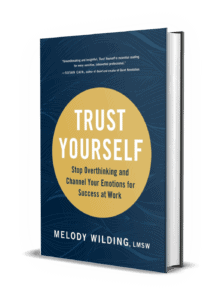For many people, work can be like a second home. You spend the majority of your waking hours dedicated to your work. Your co-workers and team may likely be the people you interact with most in your life, after family or a spouse.
Yet it’s impossible to be effective and feel fulfilled in a toxic workplace environment. Even if you work from home, a negative work environment can transcend physical walls. The intangible qualities that make work a healthy or unhealthy place can impact everything from your personal life and health to your self-esteem.
The increased stress of working in a dysfunctional office can lead directly to job burnout, particularly for Sensitive Strivers.
In my book TRUST YOURSELF: Stop Overthinking and Channel Your Emotions for Success at Work, I explain that Sensitive Strivers are high-achievers who are also highly sensitive. This refers to about one in five professionals who is driven and ambitious, but also thinks and feels everything more deeply.
Why Toxic Workplaces Affect Sensitive Strivers More
- Your deeper sensory perception means you can sense – and more bothered – when things are “off”
- You feel things intensely and can be easily hurt by criticism or harsh behavior from toxic people
- You put a lot of pressure on yourself to perform and assume a sense of responsibility to make sure everyone around you likes you and is happy
- You’re attuned to everything happening (including people’s reactions), which can lead to constant vigilance that is emotionally draining
- You may have been told you’re “too sensitive” or take things “too personally” so now you’re afraid to speak up and assert yourself
- You become overworked and overstressed, which further burdens you’re already overloaded nervous system
Free BOOK CHAPTER
Turn your sensitivity into a strength and regain your confidence at work
Get exclusive access to Chapter One of my book, Trust Yourself: Stop Overthinking and Channel Your Emotions for Success at Work.
By submitting this form you consent to receive newsletters and promotions via email. Unsubscribe or opt-out any time. See our Privacy Policy.
8 Signs of a Toxic Workplace
How can you identify if you’re trapped in a hostile workplace? Here are eight telling signs you may be working in a toxic office environment.
1. You’re told to feel “lucky you have a job.”
If you’ve ever heard this statement from your boss, it’s a major red flag. This scare tactic is a means of threatening you into staying in a marginalized position and is symptomatic of an organization that thrives on bullying behavior and control.
2. Poor communication.
Do you feel like you’re left out of the loop regarding important information? A pervasive lack of communication characterizes most toxic workplaces. You may get little to no feedback about your performance, and when you do, it’s negative and harsh — not the constructive type.
You may be doing the work of two, three, or four people, yet it’s not unusual for your boss or colleagues to take credit for your accomplishments.
3. Everyone has a bad attitude.
If you walk into work and everyone around you is miserable a la “Office Space,” then you may be trapped in a hostile environment. In this type of office, there is no enthusiasm; no one coming in with smiles on their faces and no one ever says “I love working here.” A high turnover rate among employees is a good sign that people are fleeing very quickly, most likely because of their unhappiness and poor morale at the office.
4. THERE’S ALWAYS OFFICE DRAMA.
If cliques dominate your office, it can feel as if you’re back in high school all over again. You may be anxious and paranoid that your colleagues are talking about you. Toxic, cliquey co-workers are most likely to be found hovering around the water cooler whispering in each other’s ears. They make what should be friendly workplace competition seem hostile and dog-eat-dog. There’s always rumors or gossip floating around the office; misunderstanding, favoritism, and infighting are the norm.
5. DYSFUNCTION REIGNS.
Do meetings feel like a waste of time, inevitably blowing up into disorganized chaos where nothing is accomplished? Are the company’s operations disjointed and failing? Toxic workplaces are full of confusion, arbitrary deadlines, lack of focus, and a general malaise that “this is the way it’s always been done.” If new policies or regulations are constantly getting added, or if management is never around to help solve problems, these are symptoms of a larger problem stemming from poor leadership and low morale.
6. YOU HAVE A TYRANNICAL BOSS.
This type of boss is always trying to control your every move and you feel as if he or she is just waiting to pounce on you for messing up. Toxic bosses usually seem unwilling to listen to others and feel as if their way is always the right way. Your boss loves wielding his or her power and showing others that they’re in charge. He or she probably isn’t willing to lend a hand to help in tasks or give you credit for a job well done. If you feel as if your boss would expect you to come to work even if you were on your deathbed, you might be experiencing a tyrannical and toxic boss.
7. THERE’S NO ROOM FOR GROWTH.
If you’ve approached management or HR several times regarding a lack of recognition and growth opportunities (such as promotions, raises, and challenging assignments), and have seen no changes, it may be time to leave.
8. YOU FEEL IN YOUR GUT SOMETHING IS OFF.
When your intuition says something is amiss, trust it. Physical symptoms you develop, such as sleepless nights or a racing heartbeat, can be your sensitive nervous system alerting you of danger.
Get My Book: Trust Yourself
 Groundbreaking and insightful, TRUST YOURSELF is essential reading for every sensitive, introverted professional. Wilding does a brilliant job of giving you tools to regain your confidence and become your most empowered self.
Groundbreaking and insightful, TRUST YOURSELF is essential reading for every sensitive, introverted professional. Wilding does a brilliant job of giving you tools to regain your confidence and become your most empowered self.
––Susan Cain, author of Quiet and creator of Quiet Revolution
Trust Yourself offers a neuroscience-based blueprint based on decades of research and client work to help you break free from stress, self-doubt, and perfectionism so you can regain your confidence at work and reclaim control of your life.
In Trust Yourself, discover how to:
- Achieve confidence and overcome imposter syndrome
- Find your voice to speak and act with assertiveness
- Build resilience and bounce back from setbacks
- Enjoy your success without sacrificing your well-being
If you’re an empathetic, driven person trying to navigate your career and learn how to believe in yourself in the process, Trust Yourself offers the mindset and tools to set you on the path to personal and professional fulfillment.




